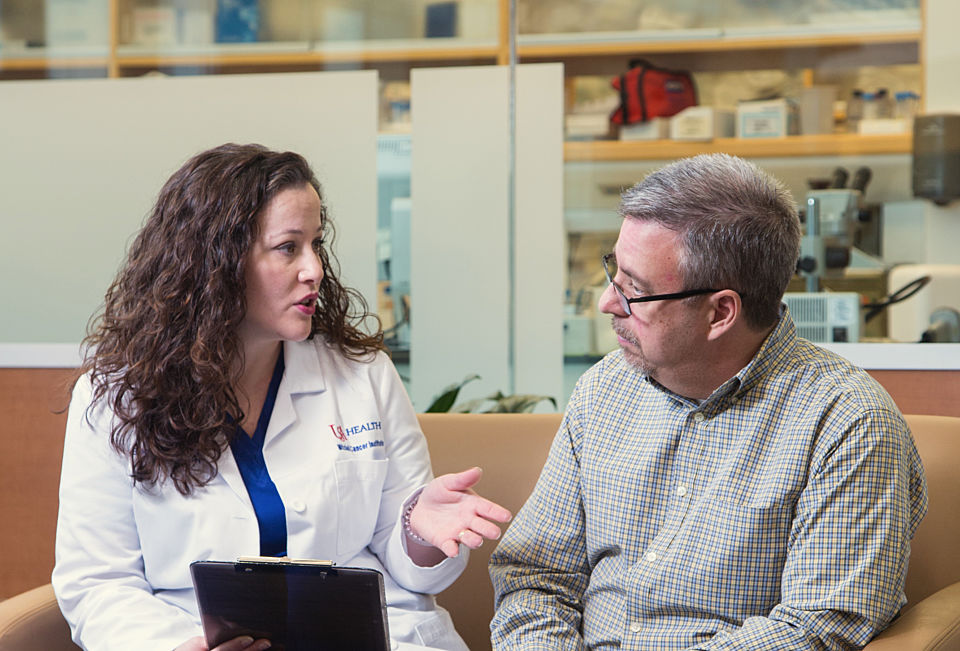What is Colon Cancer?
Colon, or colorectal, cancer starts in the large intestine (colon) or the rectum (end of the colon). It is one of the leading causes of cancer-related deaths in the United States. Early diagnosis, however, can often lead to a complete cure.
Almost all colorectal cancers start in glands in the lining of the colon and rectum. There is no single cause of colon cancer. Nearly all cases begin as noncancerous (benign) polyps, which can develop into cancer.
Other types of cancer can affect the colon. These include lymphoma, carcinoid tumors, melanoma and sarcomas. These are rare.
Risk Factors
Your risk of colon cancer increases if you:
- Are older than 60
- Are African American or of eastern European descent
- Eat excessive amounts of red or processed meats
- Have colorectal polyps
- Have inflammatory bowel disease (Crohn's disease or ulcerative colitis)
- Have a family history of colon cancer
- Have a personal history of breast cancer
Certain inherited diseases also increase the risk of developing colon cancer. Two of the most common are:
- Familial adenomatous polyposis (FAP)
- Hereditary nonpolyposis colorectal cancer (HNPCC), also known as Lynch syndrome
What you eat may play a role in your risk of colon cancer. Some studies show colon cancer is linked to high-fat, low-fiber diets. Smoking cigarettes and drinking alcohol are other risk factors.
Symptoms
Many cases have no symptoms, but the following symptoms may indicate colon cancer:
- Abdominal pain and tenderness in the lower abdomen
- Blood in the stool
- Diarrhea, constipation or other change in bowel habits
- Narrow stools
- Weight loss with no known reason
Exams and Tests
With screenings, colon cancer can be detected before symptoms develop and when it is most curable.
Your doctor may perform a physical exam, which can detect a lump (mass) in the abdomen. A fecal occult blood test (FOBT) may detect small amounts of blood in the stool. This may suggest colon cancer. This test should be performed along with a colonoscopy—which examines the entire colon—or sigmoidoscopy—which examines the part of the colon nearest to the rectum—to screen for and diagnose colorectal cancer.
Blood tests that may be done include:
- Complete blood count (CBC) to check for anemia
- Liver function tests
If you are diagnosed with colorectal cancer, more tests are conducted to stage the cancer, or determine if it has spread. PET, CT or MRI scans of the abdomen, pelvic area, chest or brain may be used to stage the cancer.
Stages of colon cancer are:
- Stage 0: Very early cancer on the innermost layer of the intestine
- Stage 1: Cancer is in the inner layers of the colon
- Stage 2: Cancer has spread through the muscle wall of the colon
- Stage 3: Cancer has spread to the lymph nodes
- Stage 4: Cancer has spread to other organs outside the colon
Treatment
Treatment depends on a number of factors, including stage of the cancer. Treatments may include:
- Surgery to remove cancer cells
- Chemotherapy to kill cancer cells
- Radiation therapy to destroy cancerous tissue
Surgery
Stage 0 colon cancer may be treated by removing the cancer cells. This is done through a colonoscopy. Stages 1, 2 and 3 cancer typically require a colon resection—more extensive surgery to remove the cancerous part of the colon.
Chemotherapy
Almost all patients with stage 3 colon cancer should receive chemotherapy after surgery for six to eight months. This is called adjuvant chemotherapy.
- Chemotherapy is also used to improve symptoms and prolong survival in patients with stage IV colon cancer.
- Irinotecan, oxaliplatin, capecitabine and 5-fluorouracil are the most commonly used drugs.
- Monoclonal antibodies, drugs that use the natural immune system functions to fight cancer, may be used alone or in combination with other cancer treatments.
Radiation
Radiation therapy is sometimes used in patients with colon cancer. It is usually used in combination with chemotherapy for patients with stage 3 rectal cancer.
For patients with stage 4 disease that has spread to the liver, treatments may include:
- Burning the cancer (ablation)
- Delivering chemotherapy or radiation directly into the liver
- Freezing the cancer (cryotherapy)
- Surgery
Outlook (Prognosis)
In many cases, colon cancer is treatable when it is caught early. Your outcome depends on many things, especially the stage of the cancer. When treated at an early stage, many patients survive at least five years after diagnosis. This is called the five-year survival rate.
If the colon cancer does not recur within five years, it is considered cured. Stage 1, 2 and 3 cancers are considered possibly curable. Stage 4 is the most advanced cancer.
Possible Complications
- Blockage of the colon, causing bowel obstruction
- Cancer returning in the colon
- Cancer spreading to other organs or tissues (metastasis)
- Development of a second primary colorectal cancer
When to Contact a Medical Professional
Call your healthcare provider if you have:
- Black, tar-like stools
- Blood during a bowel movement
- Change in bowel habits
- Unexplained weight loss
Prevention
The death rate for colon cancer has dropped in the last 15 years. This may be due to increased awareness and screening by colonoscopy. Men and women age 50 and older should have a colon cancer screening. Patients at higher risk may need earlier screenings.
During a screening, your doctor may find precancerous polyps. Removing these growths may prevent colon cancer.
Changing your diet and lifestyle is important for preventing cancer. Medical research suggests that low-fat and high-fiber diets may reduce your risk of colon cancer.


